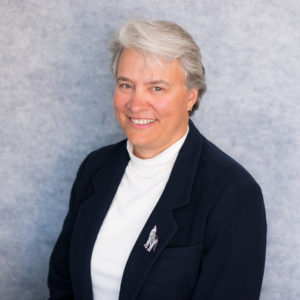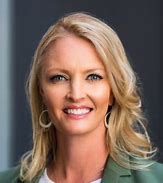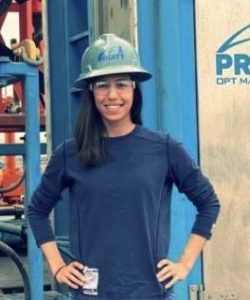Over many decades, the Permian Basin’s Good Old Boy network found a lot of oil, pioneered a lot of recovery techniques, and made the Scharbauer Hotel the stuff of legend.
Today’s networks are more inclusive, with women increasingly taking roles in field work, in skilled positions, in management, in corporate leadership, and in jobs up and down the spectrum.
Education is one of those roles, and Jennifer Miskimins, Ph. D., is one whose influence spans several states. Her fulltime position is Department Head
at the Colorado School of Mines, where she specializes in well completions, stimulation and formation damage and production issues. In the Permian Basin, she teaches Petroleum Engineering for Non Engineers at the Midland College Petroleum Professional Development Center. Dr. Miskimins also worked in the corporate world for eight years as a production engineer for Marathon Oil, so she has seen that side of the business as well.
Both of her parents were teachers, and her grandmother pioneered schoolteaching in a wide open Wyoming landscape. So Miskimins grew up immersed in education—and she found science exciting from her earliest years. “Science was something that was just very enjoyable for me,” she recalled. Her parents bought her a home chemistry kit, with which she performed experiments—some of which were in the book and some of which were her own creations. She managed to do that without starting any fires, so she considers herself lucky.
“I was always encouraged to do what I wanted to do—I never knew any different, being a female. My folks just said, ‘Do whatever you’re going to do.’”
When she set off for college, she knew engineering was in her future because it involved her passions for science and math. As yet, however, she knew very little about petroleum engineering. Her uncles worked in oil and gas, but her nuclear family was not in the business.
Early in her college experience, she had an epiphany. “When I started working my first couple of internships, I remember starting to realize: Oh, pumping units—those are the things I’ve been driving by all my life.”
Miskimins’ interest in oil was piqued by a Marathon internship over the summer after her freshman year. “I went to work with them in Cody, Wyoming, and just fell in love with being out in the field.” Being the lone woman in the field was never a problem, she said. The men “kind of adopted me, tried to make sure I didn’t get myself into trouble.”
After working for Marathon for eight years, she returned to school for the Masters’ and doctorate she needed to move into her family’s teaching heritage.
In education, she sees a need for earlier introductions for girls to STEM subjects. Those that do know about engineering don’t often realize there are engineers in petroleum. “Even if our percentages [of females] have gone up in our classes now, it will be 10 or 20 years until those females are in supervisory positions. So we’re still just building that momentum,” she said.
She encourages female students to find mentors—male and female—to help them grow as people and as professionals.
Some obstacles to recruiting for petroleum engineering are not gender related. As younger people are taught to eschew fossil fuels, it has become more challenging to overcome those biases as well. At Colorado School of Mines the resistance in that area is less than it would be at, say, Berkeley or other more liberal institutions, but long conversations are still more necessary than they were a few years ago. Conversations and recruiting materials now include carbon capture, sequestration, geothermal, and other ESG friendly topics.
The workplace is beginning to acknowledge differences in career paths for women, she said—specifically, to start families. Family leave for women and men has become more common, which she sees as a positive. There has been progress in “understanding that things like that can impact a career trajectory, and that [companies] need to be aware of that and make accommodations.”
She continued, “I’d like to think we’re past the point of not having women in the field. We’ve had plenty of folks now that are doing that on a daily basis.”
Companies are generally looking simply for the best engineer for a position, regardless of gender, she observed, although “there are always exceptions to the rules. You hear about things, but it’s a lot fewer times now.”
Tracee Bentley is president and CEO of Permian Strategic Partnership, coming to Midland from Denver in March of 2019. While Bentley has not been on the payroll of any oil or service companies, she’s spent the last several years working with industry organizations.
Her arrival in oil and gas came at the end of a circuitous route. She’d grown up in a farm and ranch family in Colorado. Her interest in energy at that point was as a consumer. Seeing how much energy was required for irrigating fields, she quickly understood its important to ranch life. “It’s something we have to have, and a lot of it—it’s a major part of the budget,” she said.
Studying public relations in college and graduate school, Bentley drew upon her own upbringing on the ranch to fashion a unique perspective, one that would lead her to work at the Farm Bureau in Washington D.C. There, in the 1990s, she heard lively energy debates on such topics as fossil fuels as well as wind, solar, biofuels, and others. “There I really got the opportunity to study and better understand each one in detail.”
After a few years as a consultant with energy companies, she was invited by then-governor John Hickenlooper to join his staff as Deputy Director of the Colorado Energy Office. His interest in her was because she understood all forms of energy—and also because she was a Republican. Her farm and ranch background was also a plus.
She worked her way up to legislative director, a position she held until he declined to run for re-election in order to move to the Senate. Bentley recalls Hickenlooper as extremely interested in hearing all sides of every matter, including energy.
From March 2015 to March 2019 Bentley was executive director of the Colorado Petroleum Council, an industry trade association. She was there when she heard from a friend about the opening of the Permian Strategic Partnership, where her unique skills and experiences were a perfect match.
In addition to her appropriate experience with multiple forms of energy and in dealing with legislative bodies, she discovered a particular link to Texas—her birthday is Texas Independence Day, March 6.
Along the way she feels blessed to have had “amazing mentors” who gave her great insights.
One whom she regards particularly highly was Lola Spradley, the first female speaker of the Colorado House of Representatives. “She, in my mind, was the perfect mix of tough and compassionate. She knew when to be compassionate and she also knew when to be tough, and at times she could be both, depending on the situation. That’s something that I find myself facing often—and you have to be able to be both.”
The public has often had a hard time seeing that balance in women leaders. If one is tough, she’s thought of as too hard, and if compassionate, it’s because “she’s a woman.” Bentley tries to ignore what people think and stick with her convictions as to which way to proceed.
Governor Hickenlooper was another whose mentorship she appreciates. “He was always the first to poke fun at himself or to admit that, ‘I don’t know what I don’t know.’” He was not afraid to surround himself with experts or with people having opposing views. His humility and open-mindedness, atypical for political figures, was also an example for Bentley.
In leadership of the Permian Strategic Partnership, she balances the tough/compassion line in order to bring the community together for the common good. She feels the PSP has accomplished more in its two years than many of its founders thought possible, in funding schools and other infrastructure, and influencing public decision making regarding roads in particular.
She also realizes that much is still to be done.
Regarding women in the oil and gas workplace, she offers a different view. “My perspective may be a little different in that my career in oil and gas has always been in leadership, so I can only speak to that. I don’t necessarily know what it’s like to be a brand new hire coming in at an entry level.”
In her leadership role, Bentley says she’s been able to address people sticking to the “old traditional ways and say, okay, we’ve done it that way for years, let’s try something new and see if it works.” In most cases, she says she’s been supported when looking to go down a different path.
For her, it goes back to tough/compassionate. “I hope that I come across as compassionate in the way that I want to execute things. But also, I’m a big stickler for, you’re going to have to do something different if you want a different result.”
On the Rig Floor
Lilly Duarte has a BS in Physics from Southwestern University and a Masters’ in Petroleum Engineering from the University of Tulsa. So, to borrow from the late songster Jim Croce, she could be “sitting in an air conditioned office in a swivel chair.”
Instead, she enjoys being out on the rig working 12-hour shifts for weeks at a time, so she’s MPD supervisor for a drilling company. She’s often the only woman on the site, but being a woman among men is not new to her.
“I have three brothers, so I was raised competing with them,” she said. One is older, one is younger, and one is her twin. “So to me, working with a lot of guys comes natural. I’m not sure I could say the same about working with all women,” she laughed.
There are challenges, however. “As much as I want to be a bro, I’m never going to quite be a bro. For the most part, they do start treating me like it once I get in their group and gain their trust. But at the end of the day, I’m a woman.”
This has its positives and negatives. “You get either better treatment, or you can get worse treatment. Some guys strongly do not feel women belong out there working in the oilfield.”
Early on as an entry-level engineer she worked under two company men. One was awesome and one was particularly hostile. The latter “was like, ‘You’re a woman, you belong in the kitchen—and you’re an engineer out here trying to steal my job,’ so it was a double whammy. It was not good,” she recalled.
Fortunately, her company took care of the situation before it dragged on, so she thought, “Okay, some people have my back.”
“Ninety-eight percent of the people out here are amazing,” she continued. “If you’re wanting to learn, they’ll teach you. There’s just a couple of bad apples.” Even those “bad apples” often become more accepting after they work with her a while. Occasionally the acceptance goes overboard.
“They would say, ‘She’s so smart,’ and they would go over the top, and I’m like, ‘I’m just doing my job.’” She feels that they were so surprised that a woman knew something that they made more of it than they would have for a man.
As a supervisor, she moves from rig to rig often, which means she meets new people regularly. Sometimes—but not often—the men she meets are hesitant, wondering if a woman can know enough to do the job. Once she proves her worth, they usually fully accept her.
Duarte sees three principles for success in the oil patch no matter the gender. “The first one is, just do a good job and want to do a good job. Two is have a sense of humor.” She noted that hard field work under sometimes harsh conditions requires a sense of humor as a coping mechanism.
Number three may be a surprise to someone who’s not worked in the field. “The third one is, share your food.” She likes to make brownies, “And they love that,” she said.
For Duarte, a love for math and science led her to engineering as she entered college. A visit to the school library introduced her to petroleum engineering and particularly to drilling. Her petroleum degree would wait until postgraduate work.
Having been a cross country runner in high school and college, she turned down office jobs in order to stay in the field. Should she move to an office one day, she feels she’ll have a greater understanding of what happens on the rig than if she’d gone straight to the office.
As to that future, she is still deciding how to proceed. Deciding how and when to start a family is on her mind. As Jennifer Miskimins noted, the challenges in this regard are different for women than for men. More companies are taking note of this but there is much to consider.
The pandemic gave Duarte a new perspective. “After 2020 I thought, this world’s crazy. [So] we have to be intentional about what we do with our lives.”
From education to the C Suite to the rig floor, women are taking new roles. And indeed—being intentional about life is a lesson for everyone.
______________________________________________________________________________________________
Paul Wiseman is a freelance writer in the oil and gas sector. His email address is fittoprint414@gmail.com.














